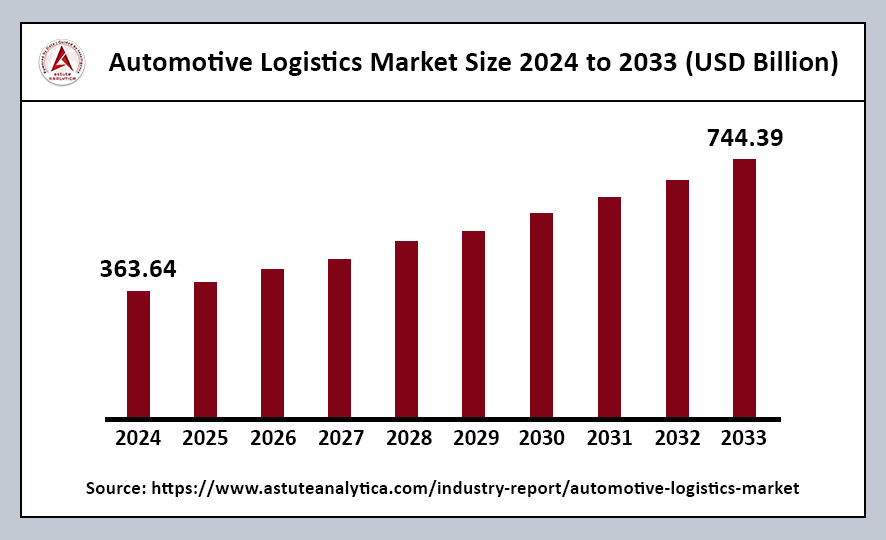The global automotive logistics market was valued at US$ 363.64 billion in 2024 and is projected to reach US$ 744.39 billion by 2033, reflecting a Compound Annual Growth Rate (CAGR) of 8.60% during the forecast period from 2025 to 2033.

The demand for automotive logistics is rapidly gaining momentum as the industry faces escalating production volumes and evolving distribution requirements. In 2024, the global automotive sector is projected to produce approximately 91.3 million vehicles, highlighting the urgent need for comprehensive logistics services that manage everything from inbound parts management to the final dispatch of vehicles.
This surge in production volume is closely linked to significant technological shifts within the industry, including electrification, digitization, and the development of more complex supply chains. These advancements are reshaping the logistics landscape, necessitating more sophisticated solutions to meet the demands of modern automotive manufacturing. As the automotive logistics market evolves, applications are broadening beyond basic vehicle movement. The industry is increasingly embracing real-time tracking, multi-modal transit, and automated warehousing strategies.
Automotive Logistics Market Key Takeaways
- By Logistics Type, Inbound logistics currently commands over 35% of the global automotive logistics market.
- In terms of product types, automobile parts dominate the automotive logistics market, holding over 55% market share.
- When examining logistics activities, transportation reigns supreme in the automotive logistics market, capturing over 80% of the total market share in 2024.
- In the realm of distribution, international distribution holds a commanding over 65% market share in the automotive logistics market.
Regional Analysis
Asia Pacific’s Dominance in the Automotive Logistics Market
Asia Pacific holds an impressive over 45% market share in the automotive logistics market, a position driven by its immense consumer base, world-class manufacturing hubs, and increasingly sophisticated supply chains.
- Robust Infrastructure Projects: The region has invested heavily in infrastructure development, including roads, ports, and logistics facilities. These enhancements facilitate smoother transportation and reduce bottlenecks, allowing for more efficient movement of automotive parts and finished vehicles.
- Strategic Government Policies: Governments in Asia Pacific have implemented policies designed to promote the automotive sector. These initiatives often focus on improving trade regulations, providing incentives for manufacturers, and fostering an environment conducive to innovation and growth within the logistics space.
- Drive Toward Digitalized Trade Facilitation: The push for digitalization in trade processes is transforming how logistics operations are conducted. By adopting advanced technologies such as blockchain, IoT, and AI, companies in the region are enhancing supply chain visibility and efficiency, leading to better coordination and reduced operational costs.
Growth in Europe’s Automotive Logistics Market
Europe is projected to experience significant growth in the automotive logistics market over the next few years.
- Positive Influence of E-Commerce Expansion: The expansion of the e-commerce sector and the restructuring of supply chain activities are expected to have a positive influence on the automotive logistics industry in the coming years. As more consumers turn to online shopping, the demand for efficient logistics solutions will increase.
- Home to Major Automotive Manufacturers: Europe is home to many prominent automotive manufacturers, which play a significant role in driving market growth. The presence of these manufacturers creates a robust demand for logistics services, as they require efficient transportation of vehicles and parts to meet production schedules.
- Rising Demand for Electric Transportation: The rising demand for electric transportation in Europe is significantly impacting the automotive logistics market. As consumers and businesses increasingly prioritize sustainable transportation options, the need for electric vehicles (EVs) is expected to rise.
Top Trends Escalating the Automotive Logistics Market
Adoption of Blockchain-Based Tracking Solutions: The widespread adoption of blockchain-based tracking solutions is transforming the logistics landscape by ensuring tamper-proof shipping details. This technology enhances supply chain transparency and traceability, allowing all parties to access validated and immutable records.
Synchronization of Inbound and Outbound Logistics: Automakers are increasingly establishing networks to synchronize inbound and outbound logistics seamlessly. This integration is essential for maintaining a smooth flow of materials and finished products, ensuring they receive the necessary components on time. This synchronization is particularly important for major players like Volkswagen and Tesla, who rely on consistent and timely deliveries to keep their production lines running smoothly.
Multi-Modal Expansions in Transportation: The automotive logistics sector is witnessing multi-modal expansions that link railroads, inland waterways, and advanced Roll-on/Roll-off (RoRo) fleets. This approach allows for greater flexibility and efficiency in transporting vehicles and parts across various terrains.
Demand for Integrated Supply Chain Transparency: There is a surging demand for integrated supply chain transparency within automotive operations. Stakeholders are increasingly recognizing the importance of having a clear view of the entire supply chain, from raw materials to finished products. As the automotive industry becomes more complex, the need for integrated solutions that provide real-time visibility is essential for maintaining competitiveness.
Rapid Expansion of EV Battery Production: The rapid expansion of EV battery production is reshaping specialized transport strategies worldwide. As electric vehicles gain popularity, the demand for efficient and secure transportation of batteries has surged. This shift necessitates the development of tailored logistics solutions that can handle the unique requirements of battery transport, including safety and regulatory compliance.
Increasing Reliance on Time-Critical Parts Deliveries: There is an increasing reliance on time-critical parts deliveries, which is driving the establishment of new cross-border routes. As manufacturers strive to minimize downtime and maintain production schedules, the need for rapid and reliable delivery of essential components has become paramount.
Automotive Logistics Market Segmentation
By Logistics Type
Inbound logistics, which currently holds over 35% of the global automotive logistics market, plays a crucial role in ensuring that manufacturers receive the right components at the right time. Key end users of inbound logistics in this sector include automobile assemblers such as Volkswagen, Tesla, and GM. These companies require consistent deliveries of essential components like engines, suspensions, and electronics to keep their production lines moving efficiently.
By Product Types
Automobile parts now dominate the automotive logistics market, holding over 55% market share by product type. This reflects the extensive global demand for complex components. The leadership of automobile parts in this market is driven by the proliferation of electric and hybrid powertrains, which increases the variety of components needed. These factors are fueling demand for advanced warehousing and rapid shipment services.
By Activities
Transportation activities dominate the automotive logistics market, capturing over 80% of the total market share in 2024. This prominence is largely due to the complex networks required to move millions of vehicles and parts across continents. The strength of the transportation segment is further supported by the global footprint of the automotive sector and the relentless drive for faster deliveries.
By Distribution
International distribution commands over 65% market share in the automotive logistics market, highlighting the vast scale and complexity of the cross-border movement of vehicles and parts. This dominance is fueled by expanding production networks and the pursuit of cost efficiency through global sourcing strategies.
Recent Developments in the Automotive Logistics Market
- Chinese Car Exports to Europe: In March 2025, Chinese car exports to Europe will benefit from a direct route through the Mediterranean, Black Sea, and North Africa with the launch of a new service from Cosco Shipping Car Carriers and Neptune Lines. Cosco stated that the service will offer a 30-day transit from China to the Mediterranean ports, initially operating once a month, and scaling up to a bi-weekly service by the end of 2025.
- Polaris Autoliners Expansion: In February 2025, Polaris Autoliners, a UK-based shipping company specializing in Roll-on/Roll-off (RoRo) transport, is expanding its global network with the introduction of a new weekly RoRo service from Bremerhaven (Germany) to Norway. This service will include direct calls at the ports of Oslo and Drammen, providing a reliable transportation solution for the automotive industry.
- TASARU Mobility Investments Joint Venture: In February 2025, TASARU Mobility Investments (TASARU), a Saudi PIF-owned investment entity, announced the launch of a joint venture with Bahri, the National Shipping Company of Saudi Arabia, and MOSOLF Group, a leading European provider of automotive logistics and technology solutions.
- JLR Innovation Challenge: In February 2025, JLR and its innovation partner Plug and Play launched a second Innovation Challenge aimed at innovators who can develop ways to enhance the accuracy of traceability, risk mapping, and visibility across the full length of the supply chain.
Top Players in the Automotive Logistics Market
- DHL, Kuehne + Nagel
- DSV
- CEVA Logistics
- BLG LOGISTICS GROUP AG & Co. KG
- Hellmann Worldwide Logistics
- Ryder System, Inc.
- GEFCO
- CFR Rinkens
- Penske Automotive Group, Inc.
- Imperial Logistics
- Expeditors International of Washington, Inc.
- Nippon Express Co. Ltd.
- Kerry Logistics Network
- Schnellecke group ag& co. Kg
- Other Prominent Players
Market Segmentation Overview:
By Logistics Type
- Outbound Logistics
- Inbound Logistics
- Reverse Logistics
- Aftermarket Logistics
By Product Type
- Automobile Parts
- Finished Vehicle
- Passenger Vehicles
- Commercial Vehicles
- Electric Vehicles
By Activity
- Transportation
- Airways
- Roadways
- Railways
- Maritime
- Warehousing
By Distribution
- International
- Domestic
By Geography
- North America
- Europe
- Asia-Pacific
- Latin America
- Middle East and Africa
Source: https://www.astuteanalytica.com/industry-report/automotive-logistics-market

















